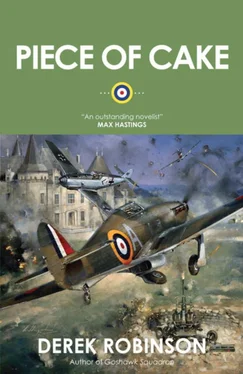It worried him, this addiction. There was the risk that it might affect his health. He noticed a certain lassitude on the mornings after his nights with her. It wasn’t weariness or fatigue; it was more like abstraction tinged with irritability, but that sort of thing could easily lead to carelessness. When he was flying, his reactions seemed a little slower, his senses not quite so acute: his eyesight, especially, wasn’t as sharp as it ought to be. That was a myth, of course, a tired old joke: too much sex had absolutely no effect on eyesight, none at all; everyone knew that. On the other hand, Hector couldn’t focus as quickly or as clearly on distant objects as he used to be able to do. Also there were occasional headaches.
He wanted to discuss it with her but he was afraid to. Talk might destroy everything. He tried to discuss it with the RAF chaplain, failed to find the words, and left that man puzzled and wondering. One night he wrote a painful letter to his father, asking advice, but when he re-read it next morning the facts were so appalling that he tore it up and burned the bits. His hands were trembling; his mouth was twisted sideways in despair and disgust. Before he quite knew what he was doing, his legs were taking him to the adjutant’s office. He asked to see the squadron commander, urgently. The adjutant obliged.
“I want to apply for a transfer, sir,” Hector said huskily. “Immediately.”
“Yes? What’s up?”
Hector clenched his teeth and stared at the blurred, upside-down markings on the CO’s blotter. “Bad love affair, sir,” he said. He felt sick.
The CO propped his chin on his fist and made his pencil spin on the desktop. Bloody silly reason for a posting, he thought. On the other hand it explains why he’s been looking like a constipated cow lately … The pencil skittered to a stop. He looked up and delivered his all-purpose, wry smile. “We’ll miss you, old boy,” he lied fluently.
Hector was lucky. A violent mid-air collision had suddenly created an urgent need for pilots in another Gauntlet squadron which was scheduled to give an important aerobatic display in two weeks’ time. This squadron was based outside Aberdeen. Hector was on the train to Scotland that same evening. The last thing he did before he left was send a telegram to Kit. A telegram was much easier to write than a letter, and it had a curtness that suited his state of mind. He never saw her again.
Pilot Officer H. G. Ramsay’s file followed him to Aberdeen in due course, with a handwritten note that read Emotionally immature? That uncertainty didn’t stop him getting promoted to flying officer a year later. Flying was no longer the most important thing in his life. He was hungry for promotion; flying was simply the fastest route to his goal of becoming Fighter Command’s youngest-ever wing commander. He went on courses, and passed them. He changed squadrons, changed aircraft, flew Hawker Furies, Gloster Gladiators, Mark Two Gauntlets. His eyesight was no better but it was no worse: things sometimes tended to blur a bit, that was all. It didn’t stop him getting promoted to flight lieutenant.
By now the year was 1937 and war was obviously on the way. Hector Ramsay was, naturally, impatient for it. Flying was all very well, promotion was all very well, but what he really yearned for was the chance to lead a squadron in battle, to make a score, pick up a DFC, maybe a DSO. The autumn of 1938 looked very promising. Germany marched into Czechoslovakia and everything pointed to war, what with hundreds of thousands of children being evacuated from the cities of England, trenches dug in parks, gasmasks issued, a balloon barrage over London, all leave canceled, camouflage paint hastily slapped on the aircraft. To top it all, Hector became a squadron leader.
That was when he got his nickname. He was given a squadron—it was called Hornet squadron, nobody quite knew why—that was equipped with Furies. It was stationed at RAF Kingsmere in Essex—exactly where the German bomber fleets were expected to cross the coast. The Fury was a delightful little biplane with a top speed of 220 mph, whereas Germany’s standard bomber, the Heinkel III, could fly at nearly 250 mph. The Dornier 17 was said to be even faster.
At his first meeting with his pilots, Hector Ramsay stood on a table and said: “Gentlemen, prepare to defend your country. Our airplanes are too slow. We cannot catch the Hun bombers. Therefore we must ram them.”
His announcement caused a thoughtful silence. In the event war did not break out; but from then on, Squadron Leader Ramsay was known as The Ram. Secretly, this pleased him. He acted up to his image—that of a pugnacious, aggressive commander, impatient for conflict, a leader whose men would follow him into the jaws of death if he gave the order—and he worked them hard.
In June 1939 Hornet squadron exchanged its Furies for Hurricanes. The Ram was immensely pleased. He launched the most impressive training program anyone could remember. It called for an extremely tough schedule of physical exercises to improve stamina as well as a vast amount of flying and theoretical work on engine maintenance, meteorology, gunmanship and the like. The Ram drove himself as hard as his men, and after five days he went down with a severe attack of shingles. The sores became so painful that he could scarcely move. Bitterly disappointed, he went off to a hospital in Torquay, determined to fight his way back to health in the minimum possible time. The squadron trundled on under a succession of temporary commanders, and this worried him. “Just rest and relax and forget everything for a while,” the doctors said. “Let’s face it, you’re not going anywhere like that, are you?” The Ram smiled and agreed, but inside he was a-twitch with anger and impatience. The shingles got worse before they got better.
He was released in the third week of August and went straight back to Kingsmere. Maddeningly, the squadron was on leave. “The previous CO thought it was a good idea,” explained the adjutant, Flight Lieutenant Kellaway. “I mean, what with the balloon likely to go up before very long. A chance to see their families and so on.”
“Get them back,” the Ram said.
“Now?”
“Instantly.”
The telegrams went off. It was three days before the last man turned up. Pilot Officer Cattermole had been salmon-fishing in a remote corner of Ross and Cromarty. He brought a couple of fifteen-pounders, which he donated to the mess. The Ram was not impressed. “I don’t like fish,” he said stiffly, “and I don’t like pilots who take foreign holidays when Hitler’s about to go on the rampage.”
“Not foreign, sir,” Cattermole said. “I went to Scotland.”
“Scotland’s bloody foreign,” the Ram growled. Cattermole widened his eyes. “I’ve been there,” the Ram told him. “I know where it is, and it’s not in England, which is the country you’re paid to defend, laddy!”
“Britain, actually,” said Cattermole, whose mother was Scottish.
“You leave the political geography to me. Now get out of that damned silly fancy-dress.” Cattermole was wearing a Norfolk jacket, heather-mixture breeches with knee-length stockings of purple plaid, and hill climber’s shoes. “You look like the Hound of the Baskervilles.”
Cattermole blinked. “Are you sure you’ve got that right, sir?” he said.
“I’m the squadron commander,” the Ram said, smiling grimly. “I don’t have to get it right. I just have to say it, and it is right. Now I want you flying in half an hour.”
Cattermole turned to go, but hesitated. “My Hurricane’s having some new bits put into it,” he said. “The fitters didn’t expect me back so soon.”
“Then take somebody else’s Hurricane.” The Ram waved at a machine that was coming in to land. “Take that one.”
Читать дальше












